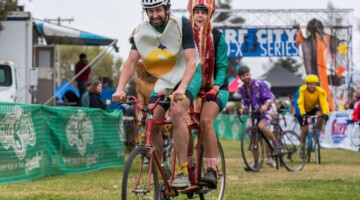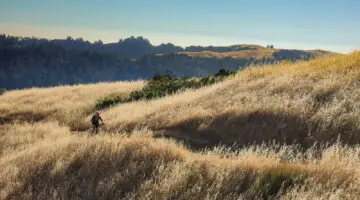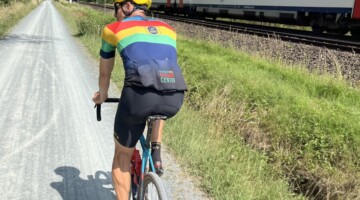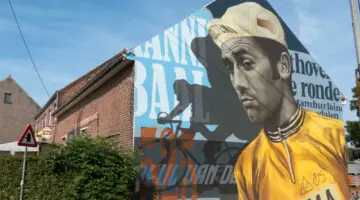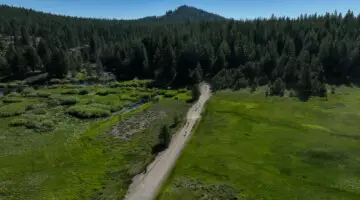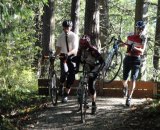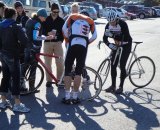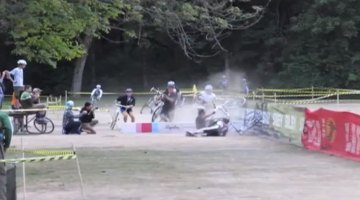Cyclocross Magazine’s Joey Mullan has taken it upon himself to interview race promoters all around the country this season to provide you with some insider details on the huge amounts of work that go into planning races and series’, and the people who are just crazy enough to love what they do.
The first promoter we’re taking a look at is Ryan Rickerts of the Cascade Cross Series, which will happen this year from October all the way into February in and around Bellingham, WA.
Joey Mullan: Who started your series?
Ryan Rickerts: I did, back in 2006.
JM:What made you want to start your own cyclocross race series?
RR: Someone called me out of thin air to suggest a specific property in Bellingham might be “perfect” for ’cross — a former gravel pit and before that a small airport — and knew I had been racing in the discipline. He didn’t really have any idea what it was about. I looked into it, then another adviser (former promoter of Belly Cross — the only CX race in Bellingham which folded in ’03 or so) said I had to do it as a series to get a draw. So I put on three races that first year, and called it the Cyclocrazed Series. The rename came about in 2008. (It took me until 2009 to get approval for the original gravel pit course that was the inspiration. It is now quite popular.)
I still often start my races by wearing a skull mask and shouting “Are you ready to get cyclocrazed?!” just to keep it real.
JM: Any other inspirations that made you want to put on the series?
RR: I started by promoting collegiate road races for the WWU Cycling team. We also invited the senior riders to race the road course while the college kids were out doing their TTT. The success level was high enough that I felt I could continue being an event promoter, and ’cross was the next step for me. It has been very rewarding, so here I am still doing it.
JM: What were the key steps taken to create the your race series?
RR: Staying consistent with at least three races a year (2010-11, we got up to five), spreading the word and enjoyment of ’cross so more people join the sport and feel good about trying it, and always building the best courses. I never compromise on course quality. That has been a hard and fast rule every year, and people who race my series know it.
JM: Do you ask for volunteers? If so, who and what do they do?
RR: The big thing my volunteers do is set up and tear down the course markings. This has to happen in a very narrow window of time and is labor intensive. Other than that, running registration. I typically supervise course building and put in a lion’s share of the labor there, then run the start and score the finish. People also jump in to help me score, especially last race of the day so maybe I can jump in and suffer!
JM: Any sponsors that your series are affiliated with your series?
RR: I have not done a lot with sponsorship, except for my bike shop sponsor Jack’s Bicycle Center. Traitor Cycles/Transition actually hosted us at a great course on their property last year. I plan to contact Shimano very soon because they have the best course tape. I should do more, but I’ve also enjoyed the non-commercial, unbranded look and feel of my races. It’s not a billboard. It’s just a bike race.
JM: How do you promote your series to bring in more participants?
RR: I don’t. Do you think I should? Maybe you could put me in a magazine. [Check!]
Honestly, I’ve done posters and newspaper ads, which I could do again, but always word of mouth and getting on the other regional calendars is the best bet.
The growth of the sport itself brings more participants, and that is one reason I’m here. More people will try the sport if there is a local race with low cost of entry. Then they might travel, buy a license, upgrade their bike, etc. Then other promoters get their businesses and everyone races more ’cross, everyone is happy and everyone wins. I love saving the world one muddy face at at time!
JM: Have you had any certain races that have been a financial flop? What happened?
RR: Any time I’ve had to change a venue last minute (usually due to a scheduling snafu with the land owner/manager), and it seems like I might have to cancel. Luckily, I’ve always pulled out an alternate venue, which even turned out to be better than the original and one has ultimately stayed in the series, but people get scared off so I get a lower turnout. Their loss! You have to trust me — I won’t let you down on race day unless I die first.
JM: Was there any point that you were about to stop race promoting?
RR: I have to reevaluate every year if this is something I want to keep doing. Is it worth all the time and stress? Every year, every race, people come up to me with a big, sweaty smile to thank me for what I do and say, “Keep it up!” All summer, I hear, “When does cyclocross start?” So I keep doing it.
And then I have to raise it to another level, because if you’re not growing, you’re dying. There will be no stagnation in my series. It will just stop or someone else will have to take it over. Not this year, though. I’m going big, not going home.
JM: Do you see any expansion or affiliations with USA Cycling and other race organizations for your race series?
RR: I have looked at partnerships with everyone from BC promoters to Seattle promoters to draw people into our neck of the woods (plus for me) and take advantage of our expansive venues (plus for them). Some have worked out, some have gone to the back burner. I’ve done races for the Festival 542 out in Maple Falls, but that weekend is centered around a road event and it’s too early in the fall for me. I like the venue but not in early September. In fact, I don’t want to put on any races in September anymore. The calendar is stacked with those hot, dusty races.
USA Cycling would have to bring a lot more to the table for me to ask people who just race ’cross locally to buy an annual license. So far, the cost/benefit has not worked out in this discipline. I am trying to encourage newcomers. They’ve got their head somewhere else, but perhaps with the recent reorganization with a dedicated cyclocross committee, that will change.
JM: What kind and how many different types of insurance are needed to do one fo your event (if any)?
RR: I go through a sports event insurance company and have been very happy with the arrangement. It offers the same coverage for the landowners and participants as other providers, and I just absorb the cost into the entry fee. So the riders don’t have to worry about any added fees for liability.
JM: What is your ambition for your series in the next 3 years?
RR: Make it rock solid! Stabilize at seven or eight races. Always bring in better course. A better scene at the races, like tents and music. Better prizes for the overall. I’d like to break 200 participants at one event. I think that could happen on the right day with the right mix of ingredients.
JM: How many races are in the your series this year?
RR: Looking at as many as seven! Whoa, did I just say that? I am going to need some help, but I know the racers want it. We’ve got US Nationals in mid-January now, so the back end of the calendar has really opened up. I think people would even race in February. It doesn’t really get that cold here, so why not? They’re doing it in Europe. Are we not tough enough? Get outta here.
All the other regional series are packing it up by the end of November, just as before. Someone has to fulfull that need. Guess who?
JM: Is the number of participants growing each year?
RR: Yes, slowly but surely. Shockingly, I had my record turnout by far in January of 2011 at Cornwall Park. This was just an experiment, and people blew my socks off with how much ‘cross they wanted in the New Year. So we are going to bring it!
Here’s my record-setting stats from last year:
• Most races in one season (5)
• Longest season (15 weeks)
• Most participants at one race (118 at Cornwall)
• Most unique participants all season (250)
• Most total participations/entries all season (441=88 person/race average)
JM: Any well known racers in your series?
RR: Tyler Ferrar showed up to one my first races, in 2007 I believe. Western Washington University gave me approval for a killer dream course on campus, complete with road closures. His girlfriend was attending the school at the time so he would ride in Bellingham a fair amount. He was on Cofidis at the time, but it was his off-season. I think he pulled out and a hot-shot Canadian like Kevin Noiles took it. Speaking of Canucks, Andrew Pinfold came out last year. Of course, we have plenty of hot shot ’cross racers right here in Bellingham that love my series: Steve Fisher and Logan Wetzel to name just two. And these guys help me build the course the night before. That’s how cool they are. I put on races for them — to me, they are the big names.
JM: Any good stories you’d like to share?
RR: You had to be there.
Oh, people love me for my Spirals of Death. Nothing causes confusion, laughter, and unexpected slide outs like a nice Spiral of Death. The first one I built, I used a baseball field marking machine and overdid it. It was three layers deep (three loops in, three loops out). People were honestly dizzy – racers & spectators alike. Ha!
JM: For the other race promoters out there, what are some words of advice to make a race series possible/successful?
RR: If you build it, they will come. I have always done it for the sport and not the money, and intentionally kept my races small so I don’t overextend my financial commitment. It has worked for me. I like the grassroots approach to growing the events. I think it lasts longer.
JM: Tell us something which not many people know about you?
RR: I play a lot of soccer, especially indoor in the fall, which is bad for my pedal stroke but good for those long sand runs. So if I run by you off the bike, pass me the ball. I’ll try to put it in the net.
JM: How can people contact you?
RR: Email [email protected] or visit http://twitter.com/cascadecross





